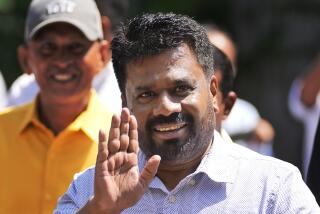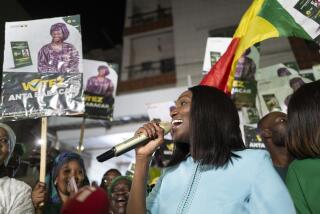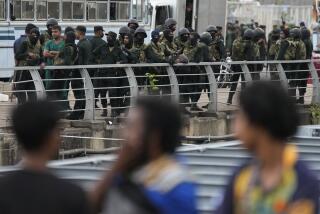Sri Lanka’s ‘War of Widows’ Goes to Polls : Asia: Two women whose husbands were assassinated have waged a bitter campaign for top job. Key issue is how to deal with Tamil rebels.
- Share via
COLOMBO, Sri Lanka — Like Americans, voters on this verdant Indian Ocean isle have just been though a wearying, divisive and often negative campaign. But they’ve also seen one top candidate perish in a bomb blast and the other blamed for it.
Today, Sri Lankans will choose an executive president--likely the first woman to assume the powerful office.
The bitter electoral contest, dubbed the “war of the widows” because both front-runners survived the assassinations of their politician husbands, has turned into a referendum on the key issue of the day: the government’s proper stance toward the 11-year-old rebellion by Tamil insurgents.
Chandrika Bandaranaike Kumaratunga was elected to the post of prime minister in August after pledging to open peace negotiations with the rebels, whose struggle has led to the deaths of 30,000 people.
On Oct. 24, the day the second set of talks was supposed to begin, Kumaratunga’s top opponent in the race for the presidency, Gamini Dissanayake, died when a bomb exploded at a late-night campaign rally here.
The separatist Liberation Tigers of Tamil Eelam, who control enclaves in the island’s north and east, were widely blamed for what police say was a suicide bombing in which 53 others died.
Dissanayake’s 51-year-old widow, Srima, was nominated by the main opposition United National Party to take his place on the ballot. A lawyer who ran for the first time in an election only last year, she has demanded that the Liberation Tigers lay down their arms before talks can resume.
Dissanayake’s death embittered an already feverish campaign in this country, where murder and thuggery have frequently been part and parcel of politics. Although his widow has never said it, campaign posters and UNP orators have accused Kumaratunga and her People’s Alliance of being in cahoots with the Liberation Tigers.
Kumaratunga, 49, broke off talks with the rebels after the bombing and launched an investigation to determine whether the Liberation Tigers were responsible.
If Kumaratunga wins today’s six-way race handily, as she is widely expected to, many observers expect her to restart the negotiations sooner rather than later.
“The ethnic issue is extra important,” said Neelan Tiruchelvam, a lawyer and human rights activist. “Her ability to address all other issues depends on success here.”
Kumaratunga’s father and mother both served as Sri Lankan prime minister. Her father, Solomon Bandaranaike, was assassinated in 1959 by chauvinists from the island’s majority Sinhalese community. In 1988, her film star-turned-politician husband, Vijaya Kumaratunga, was gunned down by Sinhalese leftists.
In her bid for the highest office in this island republic of 18 million, Kumaratunga has garnered the support of many leaders of its Muslim and Tamil minorities. She has pledged, if elected, to amend the constitution to eliminate the executive presidency by July, and restore the British-style parliamentary system that Sri Lanka had until 1978.
On Tuesday, Sri Lanka’s navy said it killed at least seven Tamil rebels in a sea battle after intercepting three rebel boats as they were about to attack a naval landing craft in the Bay of Bengal.
Over the weekend, as the campaign came to a close, four deaths were reported in clashes between followers of rival parties. Bracing for more violence, the government mobilized more than 40,000 police officers for election day duty. On the Jaffna peninsula, the rebels’ enclave in the north, the Liberation Tigers said they will not allow voting.
More to Read
Sign up for Essential California
The most important California stories and recommendations in your inbox every morning.
You may occasionally receive promotional content from the Los Angeles Times.













